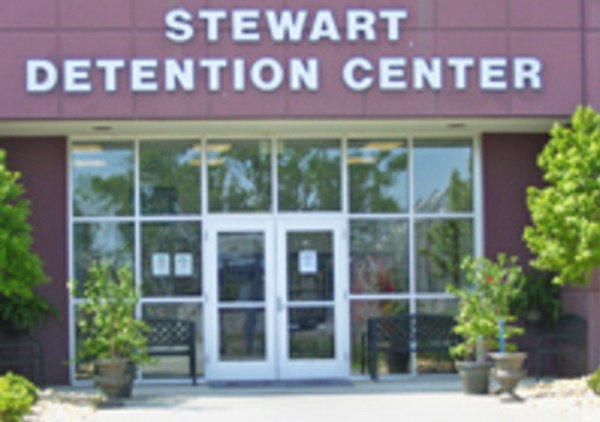As deportations escalate, lawyers ramp up defense for immigrants in rural Georgia

Lawyers are working to provide legal counsel to immigrants detained at the Stewart Detention Center in Lumpkin, Georgia. (Photo via www.ice.gov.)
Even before the Trump administration came into office and escalated immigration enforcement, the South was known as a place that was particularly harsh towards immigrants facing deportation.
Immigrant detention facilities in the region, many of which are privately-run, have been charged with abuse and substandard, prison-like conditions. Immigration judges in the region are among the strictest in the country. And perhaps most critically, immigrants held in Southern detention facilities, many of which are isolated and hours away from the nearest metro area, lack legal representation at alarming rates.
Now, with the need for immigrant legal defense greater than ever, lawyers across the region are answering the call to provide legal support to immigrants caught in the country's deportation machine.
One site where legal capacity is sorely needed and currently being shored up is the Stewart Detention Center in Lumpkin, Georgia, which houses both a detention facility and an immigration court. Stewart is run by the Nashville-based private prison corporation CoreCivic, formerly known as the Corrections Corporation of America.
Marty Rosenbluth is an immigration attorney with the North Carolina-based firm Polanco Law and recently opened up an office in Lumpkin to better represent clients who have been sent there by immigration officials after being detained in the Carolinas.
"They move people from North Carolina and South Carolina so quickly down to Stewart that we almost never have the opportunity to talk with someone before they're moved," Rosenbluth said.
In his view, this quick relocation of immigrants to remote detention centers is part of the government's strategy to facilitate more deportations. Located in rural southwest Georgia, Stewart is a two-and-a-half hour drive from Atlanta and 45 minutes from the nearest hotel, making it difficult for lawyers to come on site. Detainees fortunate enough to have legal representation often have lawyers who call in to court proceedings or communicate with clients via Skype. Most detainees, who typically are not proficient in English and have no legal experience or training, are left to navigate the complex deportation proceedings by themselves.
Many never get to talk to an attorney, Rosenbluth noted. "They lose by default," he said.
Stewart has an extremely low rate of legal representation for detainees. According to "Shadow Prisons," a joint report by several legal and immigrant advocacy groups, only 6 percent of immigrants detained at Stewart have legal counsel, compared to the national rate of 14 percent. Among those seeking asylum at Stewart, only 6 percent were granted relief, compared to 48 percent nationwide.
Having legal counsel is a critical factor in the outcome of immigration cases — and for those who would face violence and persecution in their native countries, it can be a life or death issue. One study found that women and children in removal proceedings were 14 times more likely to be able to stay in the country if they had legal representation.
Expanding legal defense at Stewart
In addition to Rosenbluth's efforts, legal capacity at Stewart will be expanded through a new project now underway called the "Southeast Immigrant Freedom Initiative." A joint effort by the Southern Poverty Law Center (SPLC), the American Immigration Lawyers Association, the American Immigration Council, the Innovation Law Lab and the American Immigration Representation Project, it aims to bring pro bono attorneys from across the region and country to provide legal counsel to Stewart detainees. Organizers hope to eventually take it to other detention facilities in the region.
A week after the project was announced, about 250 lawyers had already signed up to volunteer, according to Dan Werner, an SPLC senior supervising attorney who is directing the initiative.
"The whole [deportation] system is dependent on people being moved through it very quickly, and this project is designed to combat that," Werner told Facing South. "This is going to make the system slow down or grind to a halt, and force a real deep examination of how to come up with immigration reforms that are meaningful and protect due process rights and respect human rights."
A critical component of the project involves deploying court observers to the Stewart immigration court to document any violations of ethical standards set by the Justice Department's Executive Office for Immigration Review (EOIR). A similar court-watching effort launched recently by SPLC and Emory Law School revealed significant issues in immigration courts in Atlanta, including judges making prejudicial comments towards immigrants. SPLC and Emory Law School sent a letter to the EOIR on March 2 outlining violations and recommending reforms.
Beyond legal representation and oversight, Werner hopes the new Southeast initiative will bring people's individual stories to light and combat the vilification of immigrants that has heightened under the new administration.
"By gathering stories of people who have been detained and showing them as people who have families, who are our neighbors and friends, people with struggles, some people who are fleeing persecution, [we're] really trying to humanize the impacts of these draconian policies," Werner said.
Tags
Allie Yee
Allie is a research fellow at the Institute for Southern Studies and is currently studying at the Yale School of Management. Her research focuses on demographic change, immigration, voting and civic engagement.
